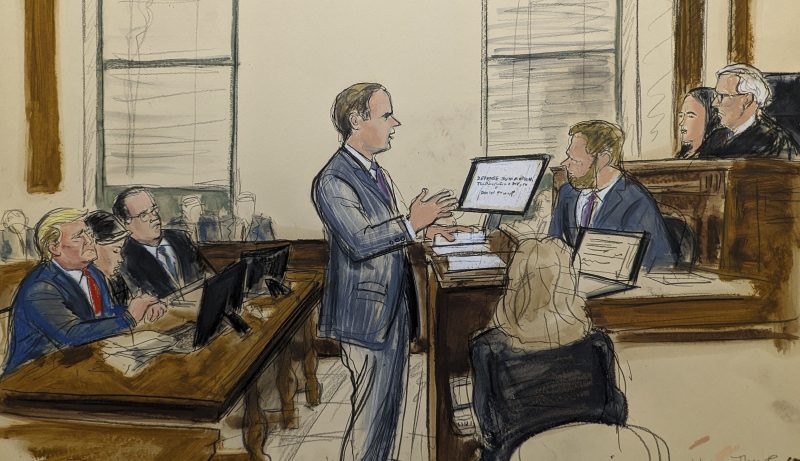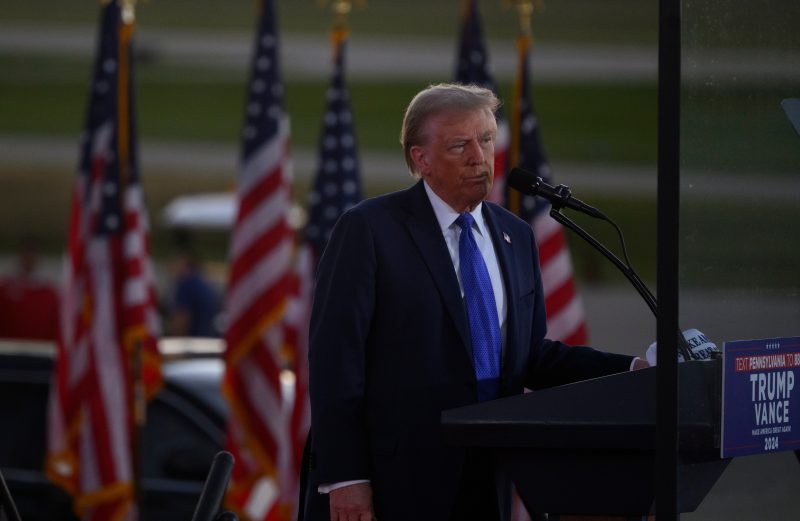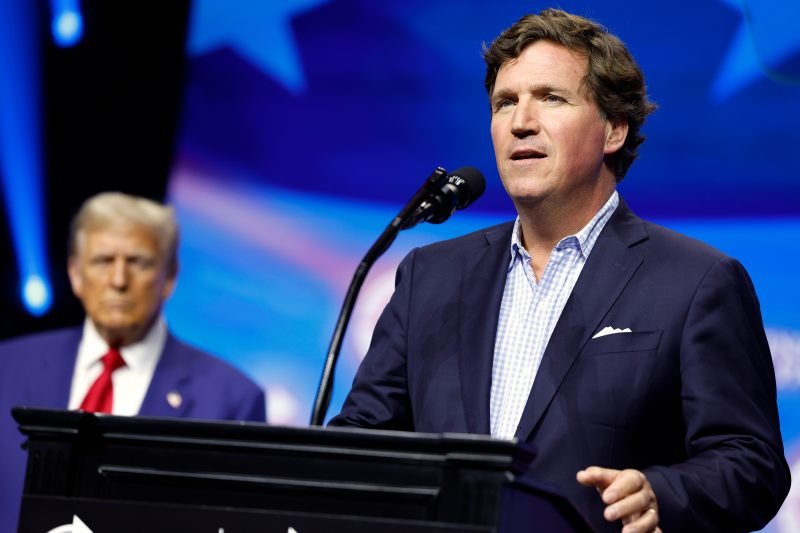Trump assails his fraud trial in courtroom speech as case winds down

NEW YORK — Donald Trump’s civil fraud trial wound down Thursday with closing statements in the case, which accuses the former president of exaggerating the values of his properties to secure better financial terms.
While much of the day unfolded in conventional fashion — with lawyers from both sides using their allotted time to offer summaries of the case — Trump was allowed to interrupt that rhythm shortly before lunchtime to deliver an extended disquisition, excoriating the judge, the entire case and New York Attorney General Letitia James, who filed the lawsuit and is seeking a $370 million penalty.
“Your honor, look. I did nothing wrong,” Trump said during his remarks, which lasted about six minutes. “They should pay me for what we’ve had to go through.”
The trial, which began a little more than three months ago, follows a lawsuit that James brought in 2022 against Trump, his namesake business and some of his adult children. The lawsuit accuses Trump and his business of misstating values and basic facts about properties in financial statements to get better terms from bankers and lenders from 2011 to 2021.
Ongoing investigations involving Donald Trump
1/6
End of carousel
Trump and his attorneys say no one was defrauded and deny any wrongdoing. Trump, the leading contender for the Republican presidential nomination this year, has repeatedly accused James, a Democrat, of being politically motivated.
The case appears to have struck a nerve with Trump, who has long touted himself as a titan of business and real estate. Trump has repeatedly attended the proceedings when he was not obligated to do so, periodically pausing in the courtroom hallway to address reporters and belittle James and the lawsuit and defend his business experience.
New York Supreme Court Justice Arthur Engoron, who is hearing the case without a jury, already ruled before the trial began that Trump and his company broadly committed fraud. Engoron will determine whether any illegal acts occurred during the process, and he will also decide any penalties.
James is seeking a $370 million penalty in the case and has asked that Trump and his sons be prohibited from serving as corporate executives in New York. She also requested that an independent monitor be appointed to oversee the Trump Organization and has requested strict limitations on its ability to obtain new loans or new assets.
“This case has never been about politics or personal vendetta or about name-calling,” James said after the proceedings concluded Thursday. “This case is about the facts and the law. And Mr. Donald Trump violated the law.”
Speaking on Thursday morning — not long after a bomb threat was reported at his home — Engoron thanked attorneys on both sides of the case for their work. His decision in the case is expected to come in a written form, and the judge said he hoped to issue it by Jan. 31.
Christopher Kise, an attorney for Trump, said during his closing remarks that James was “weaponizing” a statute to go after the former president. Kise said James was politically driven, and disputed the idea that Trump cheated anyone. There were no complaints, Kise noted, and no banks ever sued Trump over their loans.
“You just cannot allow the attorney general to pursue a victimless fraud and impose the corporate death penalty,” Kise said.
Kevin Wallace, an attorney with James’s office, said the Trump side had only offered stale arguments that courts have already rejected. “The most critical acts are undisputed,” Wallace said.
The trial highlighted some inconsistent methodologies Trump’s company used while compiling financial statements. In one case, a penthouse was falsely valued as if it were about three times its actual size. In another, a Manhattan apartment building was valued as if all units could be sold at market rate, even though several apartments were rent-stabilized and could not be sold.
On Thursday, James’s office sought to tie Trump directly to those records. Andrew Amer, an attorney with her office, said Trump certified the accuracy of the financial statements at issue and “had motive to inflate his net worth.”
Wallace said the loans Trump got were “absolutely critical” to the company. Getting beneficial interest rates that were “secured by fraud [was] vital to the company’s operations and also for the run for president,” Wallace said. The defendants were “doing the rich man’s version of searching the cushions for change.”
In November, Trump clashed with the judge while testifying, dismissing Engoron’s pretrial ruling as wrong and saying he was facing “a very unfair trial.”
Engoron admonished Trump during that testimony, saying it was “not a political rally,” and urged Kise to control his client. The judge had also issued a limited gag order early in the trial blocking Trump from commenting on Engoron’s staff after Trump posted a photograph of Engoron’s law clerk on social media. Engoron has twice fined Trump for violating the order, penalizing him a combined $15,000.
This month, Trump’s attorneys alerted the judge that their client wanted to speak during closing statements. In an email exchange made public this week, Engoron said he would allow Trump to speak if he followed specific rules, including not delivering “a campaign speech” or impugning the judge, his staff or James.
Kise replied that Trump “cannot agree” to the restrictions and called them “very unfair.” Engoron then issued a deadline for Kise to “take it or leave it,” and no response was included in the email chain that was released. Engoron also denied an emailed request from Kise to postpone Thursday’s proceedings because of the recent death of Trump’s mother-in-law.
On Thursday in court, Kise revived his request for Trump to be able to speak as part of his side’s closing remarks. Engoron asked if Trump would agree to stick to subjects related to the case, echoing his emailed request. Instead of answering directly, Trump launched into a speech from his seat in the courtroom.
“What’s happened here, sir, is a fraud on me,” Trump said. “If I’m not allowed to talk about [the political motivation] — it really is a disservice. I would say that’s a big part of the case. I would say it’s 100 percent.”
Engoron asked Kise to “please control your client,” but Kise did not appear to make any effort to do so. Engoron audibly sighed and gave Trump one minute to wrap up his remarks.
“I know this is boring to you,” Trump said. “You have your own agenda. You can’t listen for more than one minute.”
Engoron also challenged Trump on a claim that he had never been in trouble with banks before.
“By the way, you said you’ve never had a problem — haven’t you been sued before?” Engoron said.
“I should have won it every time,” Trump replied.
After Trump spoke, Engoron said the defense had used its allotted time and that the court would break for lunch. Later in the afternoon, Trump spoke to reporters, repeating his complaints about James and the case.
The New York case is a civil matter, not criminal, so nobody faces possible time behind bars as a result. Trump has also been charged in four separate criminal cases in New York City, Washington, D.C., Florida and Georgia. He has denied wrongdoing in all of those cases, as well.
Berman reported from Washington. Wesley Parnell in New York and Amy B Wang and Maegan Vazquez in Washington contributed to this report.



